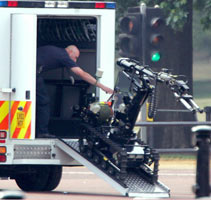|
British
Police Make New Arrests, Raid Homes
 |
|
Police sources said that security forces were operating now under new secret guidelines. (Reuters)
|
LONDON,
July 23, 2005 (IslamOnline.net & News Agencies) – British police
have arrested a second man in south London as they combed the city in
one of the biggest manhunts and home raids in British history for four
men wanted for failed bomb attacks on London's transport system.
"He
was taken into custody last night. He was arrested in the Stockwell
area," a police spokeswoman told Reuters Saturday, July 23.
This
was the second arrest in the area close to the site of one of the
failed bomb attacks, which took place on Thursday, July 21, two weeks
after bombers killed 52 commuters in the British capital.
The
first man was being held under a section of Britain's 2001
anti-terrorism law relating to the "commission, instigation or
preparation of acts of terrorism," a police spokeswoman told
Agence France-Presse (AFP).
Police
released Friday, July 22, closed circuit television pictures of four
suspects and appealed for the public to help track them down, but
warned that they were dangerous and not to be approached.
Details
of the manhunt dominated British TV bulletins, while newspapers
splashed the suspects' pictures beneath the words "The Four Most
Wanted", "The Fugitives" and "Human Bombs."
Police
refused to say if the men in custody were among the four suspects
pictured in the photographs.
But
the mass-circulating Sun tabloid said the first man arrested on
Friday was suspected of trying to blow up the bus in Thursday's
attempted bombings.
"One
down.. three to go," was the headline on the tabloid's front
page, above a picture of the arrested man being driven away wearing a
paper suit to protect potential evidence on his clothes.
London's
Metropolitan Police are hopeful that, unlike the July 7 blasts, when
much of the evidence was blown apart with the bombers, the suspects
and the rucksack-borne devices they abandoned will bring a mass of
clues for investigators.
Home
Raids
 |
|
Remote-controlled bomb disposal robots were deployed in the massive security operation across London. (Reuters)
|
In
a related development, hundreds of police, some armed with assault
rifles and machine guns, took part in a series of massive raids on
homes across London.
A
wide area surrounding Harrow Road was cordoned off after lunch.
A
bomb disposal robot was sent in and armed officers took over nearby
homes, the Guardian reported Saturday.
Two
women were seen to have been picked up, reportedly near an internet
cafe, a few hundred yards away. One was later carried away on a
stretcher and taken to an ambulance.
"I
was shocked," Yassim Egal, 22, told the British daily.
"One
of them had a shopping bag and a baby. They were very rough with them,
shouting 'Get against the wall'. They were telling everyone else to
clear the area. It was really terrible."
Witnesses
in Maida Vale, in western London, said that police fired tear gas
canisters through the windows of a terraced house in an operation
targeting a basement property, which is home to a Muslim family.
Venetia
Elphick, 40, a photographer, said armed police used her home as a
base.
"I
was terrified. I was in the house on my own and a man came to the door
and said 'I am the armed police'. He was sweating. I knew it was
serious straight away.
"The
policeman brought his colleague and they said they were going to use
my flat as a base because there could be a possibility of a bomb going
off in the flat opposite," Elphick said.
She
went on: "They got their machine guns out and opened the blinds
and the windows in the front room and pushed the machine guns out. I
was in the back in the kitchen and they were alerting me all along to
what was happening. They were letting off CS gas."
Secret
Guidelines
Police
sources said that security forces were operating now under new secret
guidelines, codenamed Operation Kratos, Reuters reported.
Security
pundits said the operation allows police to do whatever it takes to
make sure that a situation would not slip out of control.
London's
police chief Sir Ian Blair said his force faced "the greatest
operational challenge" in its history.
"This
is a very, very fast moving investigation," he told a news
conference on Friday. "We are facing previously unknown threats
and great danger."
The
first test came Friday after police chased and shot dead a man in
front of shocked passengers in the packed Stockwell Underground
station.
Witnesses
told of plain-clothes police pursuing a suspect on to a subway train
carriage.
He
slipped as he ran and then was repeatedly shot at point-blank range as
he lay on the floor.
Experts
said that police have now carte blanche to aim for the head and not
the body in case the suspect has a bomb.
The
subway shooting sparked a fierce debate over whether police were right
to adopt an apparent shoot-to-kill policy in a country where only
specialist officers carry weapons.
The
Islamic Human Rights Commission and anti-war campaigners condemned the
shooting as the start of an unwelcome and dangerous new chapter, but
police and London's mayor defended it.
Mayor
Ken Livingstone said the duty of the police was to protect the public
against people considered to be terrorist suspects, and police said
they had followed the man they shot from a house under surveillance
and he had run when challenged.
|